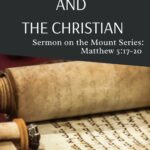EP 112: Jesus, the Law and the Christian (Matthew 5:17-20 – Sermon on the Mount Series)

Jesus did not come to do away with the Law—He came to fulfill it. As we continue on in our series on the Sermon on the Mount we will see how Christ fulfills the scriptures and what place the law has in our lives as His followers.
Through the law comes knowledge of sin (Romans 3:20), and the law is a plumbline that shows us how far we fall from God’s righteous laws. We don’t need straightening, but we need to be reconstructed, made new.
The law shuts our mouths and shows us all to be guilty (Galatians 3:22); it serves as a tutor to lead us to Christ (Galatians 3:24) and show us our great need for a Savior.
Matthew 5:17-20:
“Do not think that I have come to abolish the Law or the Prophets; I have not come to abolish them but to fulfill them. 18 For truly, I say to you, until heaven and earth pass away, not an iota, not a dot, will pass from the Law until all is accomplished. 19 Therefore whoever relaxes one of the least of these commandments and teaches others to do the same will be called least in the kingdom of heaven, but whoever does them and teaches them will be called great in the kingdom of heaven. 20 For I tell you, unless your righteousness exceeds that of the scribes and Pharisees, you will never enter the kingdom of heaven.
The word for Law means commandments or instructions. This would include the moral law, judicial law, and ceremonial Law.
The Moral Law is what we know as the ten commandments in Exodus 20.
The judicial laws guided how God’s people were to govern their lives and what they were to do and not do regarding one another.
And the ceremonial laws gave specific and very detailed instructions on how the nation of Israel was to perform sacrifices to God.
Jesus came to fulfill all these.
John MacArthur
“Because Matthew does not qualify his use of the Law, we are safe to say that it was God’s whole Law—the commandments, statutes, and judgments; the moral, judicial and ceremonial—that Jesus came not to abolish but to fulfill. It was also the other Old Testament teachings based on the Law; and all their types, patterns, symbols, and pictures that He came to fulfill. Jesus Christ came to accomplish every aspect and every dimension of the divinely authored Word.”
As believers, we respond to the law with great joy to be obedient to it, not in our own strength, but by the power of the Holy Spirit within us who has given us new hearts.
Listen to the Podcast Below:
Resources Mentioned:

The Sermon on the Mount: The Message of the Kingdom by R. Kent Hughes

With the Master . . . On the Mount: A Ladies’ Bible Study of the Sermon on the Mount by Susan Heck

Studies in the Sermon on the Mount by Martyn Lloyd Jones
Sermon: Why Do Dead People Sin (Romans 6:2) – Doug Ferrell
Show Notes:
“When Jesus came, he warned the nation of Israel of much that the Old Testament prophets had previously warned them of. This gives huge weight to the argument that we should give heed to the Old Testament.”
Susan Heck, With the Master: A Ladies Bible Study on the Sermon on the Mount
“The moment you begin to question the authority of the Old Testament, you are of necessity questioning the authority of the Son of God Himself, and you will find yourself in endless trouble and difficulty.”
Martyn Lloyd Jones, Studies in the Sermon on the Mount
5 Ways Jesus Fulfilled the Law:
- The Law and the Prophets Pointed to Jesus
- The Entire Sacrificial System of the Old Testament Pointed to Jesus
- Jesus Perfectly Kept all the Commands
- He Fulfills the Law in Believers by Means of the Holy Spirit
- Jesus Brought the Doctrines of the Old Testament to fruition by His Teaching and Person
Taken from The Sermon on the Mount by R. Kent Hughes
“The Old Testament is the Gospel in the bud; the New Testament is the Gospel in full flavor. The Old Testament is the Gospel in the blade; the New Testament is the Gospel is full ear.”
J.C. Ryle
Below Excerpt taken from Studies in the Sermon on the Mount by Martyn Lloyd Jones:
The man who has been born again, and who has the divine nature within him, is a man who is righteous and his righteousness does exceed that of the scribes and Pharisees.
He is no longer living for self and his own attainments, he is no longer self-righteous and self-satisfied. He has become poor in spirit, meek and merciful; he hungers and thirsts after righteousness; he has become a peacemaker. His heart is being purified.
He loves God, yes unworthily, alas, but he loves Him and longs for His honor and glory. His desire is to glorify God and to keep and honor and fulfill His law. The commandments of God to such a man ‘are not grievous’.
He wants to keep them, for he loves them. He is no longer at enmity against God; but now sees the holiness of the law and nothing so appeals to him as the living of this law and the exemplifying of it in his daily life.
It is a righteousness that far exceeds the righteousness of the scribes and Pharisees.
Some of the most vital questions that can be asked, then, are these.
Do you know God?
Do you love God?
Can you say honestly that the biggest and the first thing in your life is to glorify Him and that you so want to do this that you do not care what it may cost you in any sense?
Do you feel that this must come first, not that you may be better than somebody else, but that you may honor and glorify and love that God who, thought you have sinned against Him grievously, has sent His only begotten Son to the cross on Calvary’s hill to die for you, that you might be forgiven and that He might restore you unto Himself?
Let every man examine himself.
Scripture References:
- Matthew 5:17-20
- Matthew 5:1-2
- Matthew 5:3
- Exodus 20
- Luke 24:44
- Hebrews 7:27
- Hebrews 10:11-13
- 1 Peter 2:22
- Galatians 4:4
- Matthew 3:13-15
- 2 Corinthians 5:21
- Romans 8:2-4
- Ezekiel 11:19-20
- Matthew 24:35
- Matthew 5:19
- Romans 6:1-2
- John 14:21
- 1 John 5:3
- James 1:23-25
- Matthew 5:48
- Psalm 139:23-24
Recommended Resources:
- Studies in the Sermon on the Mount by Martyn Lloyd Jones
- Sermon on the Mount The: Matthew 5-7 Expositional Commentary by James Montgomery Boice
- Matthew 1-7 MacArthur New Testament Commentary by John MacArthur
- Expository Thoughts on the Gospel of Matthew by J.C. Ryle
- The Sermon on the Mount: The Message of the Kingdom (ESV Edition) by R. Kent Hughes
- Sermon on the Mount by Sinclair Ferguson
- The Beatitudes: An Exposition of Matthew 5:1-12 by Thomas Watson
- The Message of the Sermon on the Mount by John Stott
- Sermon on the Mount Teaching Series by Sinclair Ferguson at Ligonier Connect
- Logos Bible Software
- Bible Memory App
- Study Guide for Sermon on the Mount
Search me, O God, and know my heart!
Psalm 139:23-24
Try me and know my thoughts!
And see if there be any grievous way in me,
and lead me in the way everlasting!



